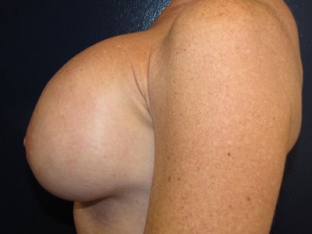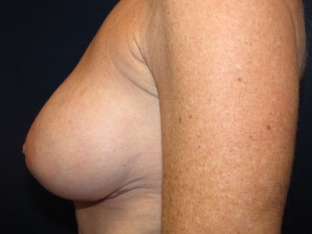Home|Blog | Non-Elective Reasons to Undergo Breast Revision
Non-Elective Reasons to Undergo Breast Revision
Many women choose to undergo breast revision surgery in order to either increase or decrease the size of their breasts. Other elective reasons for revision surgery can include changing the type of implant (going from saline to silicone; rarely the opposite), the shape or profile of the implant, or the location of the implant (usually going from submammary – above the muscle – to submuscular).
While these are common reasons to choose breast revision, they are all done by choice and not by necessity. Non-elective reasons for breast revision are not rare, though most of these are not of the acute or emergency variety, such as for bleeding (hematoma), fluid accumulation (seroma), infection, or wound separation. The following are among the most common indications for needing breast revision surgery:


Loss of Implant Integrity
Although breast implants are very strong and durable as a result of incorporating advanced technologies from decades of research as well as from scrupulous manufacturing in anti-septic environments, they still are medical devices that should not be expected to be permanent or last a lifetime. Implants will wear down over time and, given long enough, lose their integrity. This may be five years, fifteen years, or even thirty or more years. Silicone breast implants, on average, do last longer than saline implants.
It should also be understood that there is no 10-year rule, which too many women believe to be true—that implants have to be replaced every 10 years. It is absolutely false.
Though not very common, implants can also be “inadvertently” disrupted during the breast augmentation procedure. This is more common when performed by poorly trained or unscrupulous physicians who are not board-certified plastic surgeons. Implant damage can also occur during diagnostic procedures of the breast where sharp objects are inserted and accidentally perforate the implant.
Capsular Contracture
Capsular contracture is probably the most common true complication associated with implants. This is where scar tissue forms around the implants and gradually squeezes and tightens causing the implants and, therefore, the breasts to feel hard. It usually causes noticeable deformities of the breast and may be associated with pain and discomfort. It can occur on any patient regardless of age, size of implant, type of implant, placement of implant, or incision location and can occur at any point in time after surgery—from weeks to even many years later. The risk is higher with implants placed in a submammary pocket (above the muscle) and with the periareolar incision.
Though there are some non-surgical treatments that can be partially or fully effective in some instances, this is not the situation much of the time. In such instances, breast revision surgery is recommended, which involves both removal of the scar tissue as well as the affected breast implant and re-insertion of a new implant.
Asymmetry
Hardly any woman’s breasts are completely symmetrical, whether they are their natural ones or having been augmented. This can be of size, shape, location, nipple-areolar complex positioning, etc. Most of the time, this asymmetry is either hardly noticeable on casual glance or not considered to be a significant issue. However, if there is more asymmetry after surgery or the pre-existing asymmetry was not corrected enough to the patient’s satisfaction or expectations, then breast revision surgery may be warranted.
It is important to realize that it is usually virtually impossible to create perfect symmetry when the two breasts were different prior to surgery.
Implant Malposition
Having the implants positioned at noticeably different levels on the chest wall can be quite problematic, which can cause deformities and asymmetries of breast shape, height, and even of the nipple-areola position. This can also be the result of tearing or stretching of breast or chest wall tissues over time for a variety of reasons. In these situations, breast revision surgery needs to be individualized in order to address all the relevant issues so as to position the breast implants in the most appropriate position, and to repair the underlying problems as indicated.
If you think you may be a candidate for breast revision surgery for either elective or non-elective reasons, contact Dr. Steven Turkeltaub today to set up your consultation by calling (480) 451-3000.
